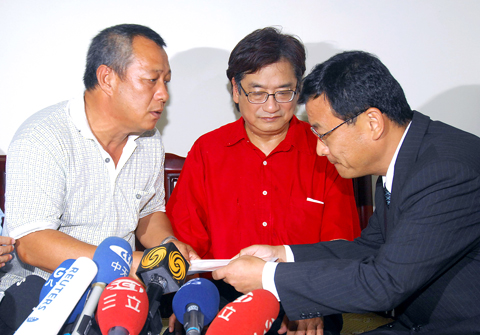Ten days after a Taiwanese boat sank following a collision with a Japanese patrol vessel near the disputed Diaoyutai (釣魚台) islands, a representative from Japan’s de facto embassy in Taiwan visited the home of the fishing boat captain and offered an apology yesterday.
Deputy chief representative of the Interchange Association Hitoshi Funamachi visited Taiwanese boat captain Ho Hung-yi (何鴻義) at his home in Ruifang Township (瑞芳), Taipei County, to personally deliver a letter of apology written by Hideo Nasu, head of the 11th Operational Region of the Japan Coast Guard.
“I bow and once again offer my sincere apologies to you over the sinking of your boat and the injuries you sustained during the collision,” Funamachi said to Ho, reading from Nasu’s letter. “I hope we will begin negotiations soon on compensation, in accordance with the law.”

PHOTO: SAM YEH, AFP
Nasu had also bowed at a televised press conference in Japan several days ago in apology over the accident.
Ho accepted Nasu’s apology, saying he was “very pleased” with the way that the Japan Coast Guard official was handling the aftermath of the accident, in which Ho lost his boat and sustained several injuries.
Meanwhile, after a 30-minute closed door meeting at the Ministry of Foreign Affairs with Minister of Foreign Affairs Francisco Ou (歐鴻鍊) yesterday afternoon, Tadashi Ikeda, the chief representative of the Interchange Association, said he hoped the peaceful end to the ordeal would strengthen Taiwan-Japan relations.
Standing next to Ou, Ikeda said he was pleased to see that Taiwan and Japan could “overcome the difficult situation together.”
“The Japanese have a saying that after the rain, the ground will be more solid and firm. I hope that Japan-Taiwan relations will continue to improve after this ordeal,” Ikeda said.
Ou welcomed the gesture by Japan, calling it a “perfect ending,” but said the next step in resuming negotiations with Tokyo on fishing rights and sovereignty claims would be the “beginning of the real, difficult task.”
The incident took place early in the morning on June 10 when a Japan Coast Guard patrol boat rammed into a Taiwanese fishing boat 11km off the Diaoyutai islands, an island chain claimed by Taiwan, Japan and China.
While the Japanese claim the crash was caused by the Taiwanese boat zigzagging abruptly, Ho insists his boat was stationary.
The Japanese agreed to release the crew and pay reparations, but held off on issuing a formal apology.
In related news, Ou yesterday confirmed that President Ma Ying-jeou (馬英九) had officially accepted the resignation of Taiwan’s representative to Japan, Koh Se-kai (許世楷), who asked to be relieved of his duties on Monday.

GAINING STEAM: The scheme initially failed to gather much attention, with only 188 cards issued in its first year, but gained popularity amid the COVID-19 pandemic Applications for the Employment Gold Card have increased in the past few years, with the card having been issued to a total of 13,191 people from 101 countries since its introduction in 2018, the National Development Council (NDC) said yesterday. Those who have received the card have included celebrities, such as former NBA star Dwight Howard and Australian-South Korean cheerleader Dahye Lee, the NDC said. The four-in-one Employment Gold Card combines a work permit, resident visa, Alien Resident Certificate (ARC) and re-entry permit. It was first introduced in February 2018 through the Act Governing Recruitment and Employment of Foreign Professionals (外國專業人才延攬及雇用法),

RESILIENCE: Deepening bilateral cooperation would extend the peace sustained over the 45 years since the Taiwan Relations Act, Greene said Taiwan-US relations are built on deep economic ties and shared values, American Institute in Taiwan (AIT) Director Raymond Greene said yesterday, adding that strengthening supply chain security in critical industries, enhancing societal resilience through cooperation and deepening partnerships are key to ensuring peace and stability for Taiwan in the years ahead. Greene made the remarks at the National Security Youth Forum, organized by National Taiwan University’s National Security and Strategy Studies Institution in Taipei. In his address in Mandarin Chinese, Greene said the Taiwan-US relationship is built on deep economic ties and shared interests, and grows stronger through the enduring friendship between

CAUTION URGED: Xiaohongshu and Douyin — the Chinese version of TikTok — are tools the Chinese government uses for its ‘united front’ propaganda, the MAC said Mainland Affairs Council (MAC) Minister Chiu Chui-cheng (邱垂正) yesterday urged people who use Chinese social media platforms to be cautious of being influenced by Beijing’s “united front” propaganda and undermining Taiwan’s sovereignty. Chiu made the remarks in response to queries about Chinese academic Zhang Weiwei (張維為) saying that as young Taiwanese are fond of interacting on Chinese app Xiaohongshu (小紅書, known as RedNote in English), “after unification with China, it would be easier to govern Taiwan than Hong Kong.” Zhang is professor of international relations at Shanghai’s Fudan University and director of its China Institute. When giving a speech at China’s Wuhan

ENHANCE DETERRENCE: Taiwan has to display ‘fierce resolve’ to defend itself for China to understand that the costs of war outweigh potential gains, Koo said Taiwan’s armed forces must reach a high level of combat readiness by 2027 to effectively deter a potential Chinese invasion, Minister of National Defense Wellington Koo (顧立雄) said in an interview with the Chinese-language Liberty Times (sister newspaper of the Taipei Times) published yesterday. His comments came three days after US Secretary of State Marco Rubio told the US Senate that deterring a Chinese attack on Taiwan requires making a conflict “cost more than what it’s worth.” Rubio made the remarks in response to a question about US policy on Taiwan’s defense from Republican Senator John Cornyn, who said that Chinese